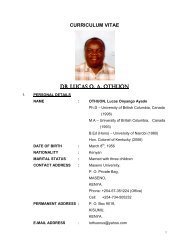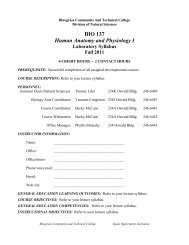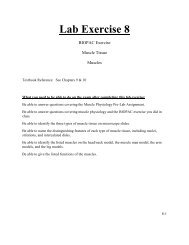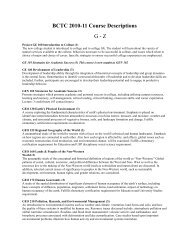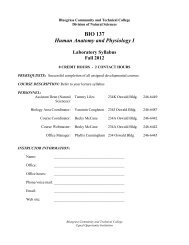THE NATURE, UNITY AND VALUE OF GEOGRAPHY
THE NATURE, UNITY AND VALUE OF GEOGRAPHY
THE NATURE, UNITY AND VALUE OF GEOGRAPHY
You also want an ePaper? Increase the reach of your titles
YUMPU automatically turns print PDFs into web optimized ePapers that Google loves.
4 <strong>THE</strong> PR<strong>OF</strong>ESSIONAL GEOGRAPHER<br />
and business people in these meetings, and the use of our successful professional<br />
alumni iii the private and public sectors in our courses and seminars can also be<br />
val u ab le.<br />
The second problem of eclecticism and disunity can also be approached locally.<br />
Most departments need to review their courses carefully for titles and descriptions to<br />
determine that they, relate to key geographic concepts and also offer some fairly<br />
clear and useful knowledge or training for ourselves and others. I may well be<br />
wrong, but it is perhaps courses with titles like economic or social or political geo-<br />
graphy which lead to the charge of parasitism, whereas we are on distinctive ground<br />
if we emphasize geographic concepts like region, spatial organization, urban or rural,<br />
transportation, migration, spatial distribution, landscape and the like. Difficult as it<br />
may be, we need also to hammer out, formally if necessary, a complementary divi-<br />
sion of labor with competing programs. The object here is to create sequences of<br />
geography courses that come to be viewed as necessary and integral parts of such<br />
interdisciplinary areas as planning, transportation, population, and environmental,<br />
urban or area studies.<br />
Finally we should proudly and explicitly offer a core course or courses sum-<br />
marizing geographic theory and methodological issues, preferably as an advanced<br />
survey rather than as a history of geographic thought. Concepts like spatial organi-<br />
zation and interaction, spatial or territorial behavior, regional development and<br />
change, evolution of landscape, regions and regionalization, graphic representation,<br />
efficiency and equity in location and in resource distribution and utilization should<br />
be emphasized, because only dimensional rather than phenomenological charac-<br />
teristics can unify physical and human, regional and topical, cultural-humanist and<br />
quantitative-locational geographies. Put more simply, a core course or courses<br />
should get across the message that location matters, that there are reasons why areas<br />
and places are different physically and culturally, that knowledge of how territory is<br />
organized and changes is a key problem in science and society.<br />
With respect to quality, there should be no mystery. It is a matter, at all levels in all<br />
activities,, of maintaining more rigorous standards, and of exercising greater self-<br />
discipline in meetings and journals.<br />
With respect to the placement of professional geographers, we are at the stage<br />
where we have to risk fights by aggressively competing for relevant planning and<br />
analytical positions in the private and public sectors. This may mean putting rela-<br />
tively more emphasis on masters programs, on internships, and on the real world<br />
involvement that is necessary to generate those internships and jobs. Too, the di-<br />
versity which was noted as a possible strength is also manifest as a weakness in the<br />
structure of many of our departmental programs. There is an understandable desire<br />
for broad coverage of the discipline, but with small staffs, this means a lack of depth<br />
and an inability to insure the quality specialized training that students need and<br />
employers deserve and which will gain the respect of other disciplines.<br />
We should not be discouraged by a review of the above problems. Geography has<br />
come a long way in the last twenty-five years. Despite the precipitous decline in our<br />
historic service role to education, despite the severe competition from regional<br />
science, urban and regional planning, and area and environmental studies, both the<br />
status and funding of geography have vastly improved. If we can maintain the<br />
momentum of recent years, we will be able to achieve as well as to deserve the<br />
centrality and occupational recognition we desire.<br />
Discussing problems of a discipline is difficult enough. Now I will take a greater<br />
risk and tackle the question of the nature of the discipline, since most of the above<br />
problems trace back to the nebulous image of geography. The question legitimately<br />
can be asked: if we cannot clearly, and with reasonable agreement, express the<br />
nature of the discipline, can and do we deserve recognition?




